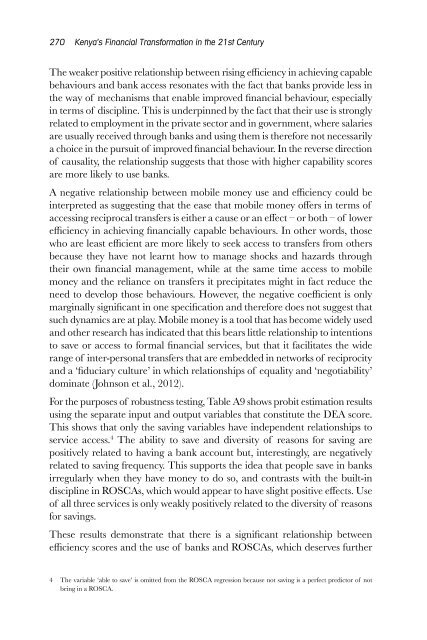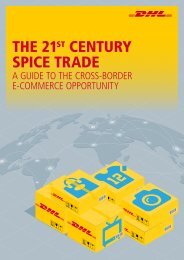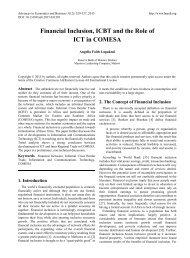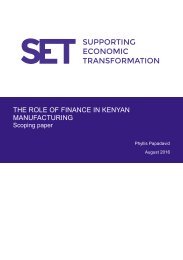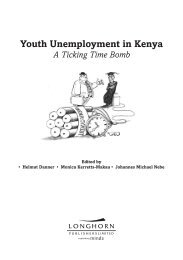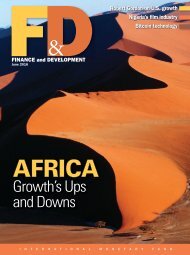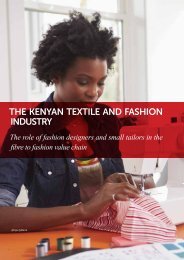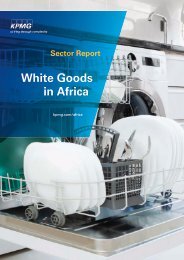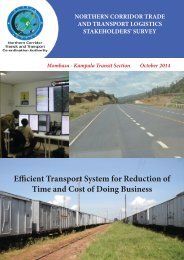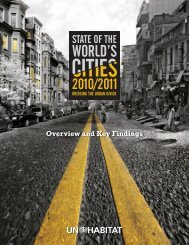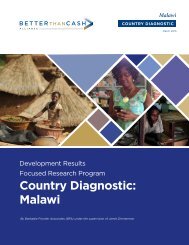in the 21st Century
hTOE305aYVW
hTOE305aYVW
Create successful ePaper yourself
Turn your PDF publications into a flip-book with our unique Google optimized e-Paper software.
270 Kenya’s F<strong>in</strong>ancial Transformation <strong>in</strong> <strong>the</strong> <strong>21st</strong> <strong>Century</strong><br />
The weaker positive relationship between ris<strong>in</strong>g efficiency <strong>in</strong> achiev<strong>in</strong>g capable<br />
behaviours and bank access resonates with <strong>the</strong> fact that banks provide less <strong>in</strong><br />
<strong>the</strong> way of mechanisms that enable improved f<strong>in</strong>ancial behaviour, especially<br />
<strong>in</strong> terms of discipl<strong>in</strong>e. This is underp<strong>in</strong>ned by <strong>the</strong> fact that <strong>the</strong>ir use is strongly<br />
related to employment <strong>in</strong> <strong>the</strong> private sector and <strong>in</strong> government, where salaries<br />
are usually received through banks and us<strong>in</strong>g <strong>the</strong>m is <strong>the</strong>refore not necessarily<br />
a choice <strong>in</strong> <strong>the</strong> pursuit of improved f<strong>in</strong>ancial behaviour. In <strong>the</strong> reverse direction<br />
of causality, <strong>the</strong> relationship suggests that those with higher capability scores<br />
are more likely to use banks.<br />
A negative relationship between mobile money use and efficiency could be<br />
<strong>in</strong>terpreted as suggest<strong>in</strong>g that <strong>the</strong> ease that mobile money offers <strong>in</strong> terms of<br />
access<strong>in</strong>g reciprocal transfers is ei<strong>the</strong>r a cause or an effect – or both – of lower<br />
efficiency <strong>in</strong> achiev<strong>in</strong>g f<strong>in</strong>ancially capable behaviours. In o<strong>the</strong>r words, those<br />
who are least efficient are more likely to seek access to transfers from o<strong>the</strong>rs<br />
because <strong>the</strong>y have not learnt how to manage shocks and hazards through<br />
<strong>the</strong>ir own f<strong>in</strong>ancial management, while at <strong>the</strong> same time access to mobile<br />
money and <strong>the</strong> reliance on transfers it precipitates might <strong>in</strong> fact reduce <strong>the</strong><br />
need to develop those behaviours. However, <strong>the</strong> negative coefficient is only<br />
marg<strong>in</strong>ally significant <strong>in</strong> one specification and <strong>the</strong>refore does not suggest that<br />
such dynamics are at play. Mobile money is a tool that has become widely used<br />
and o<strong>the</strong>r research has <strong>in</strong>dicated that this bears little relationship to <strong>in</strong>tentions<br />
to save or access to formal f<strong>in</strong>ancial services, but that it facilitates <strong>the</strong> wide<br />
range of <strong>in</strong>ter-personal transfers that are embedded <strong>in</strong> networks of reciprocity<br />
and a ‘fiduciary culture’ <strong>in</strong> which relationships of equality and ‘negotiability’<br />
dom<strong>in</strong>ate (Johnson et al., 2012).<br />
For <strong>the</strong> purposes of robustness test<strong>in</strong>g, Table A9 shows probit estimation results<br />
us<strong>in</strong>g <strong>the</strong> separate <strong>in</strong>put and output variables that constitute <strong>the</strong> DEA score.<br />
This shows that only <strong>the</strong> sav<strong>in</strong>g variables have <strong>in</strong>dependent relationships to<br />
service access. 4 The ability to save and diversity of reasons for sav<strong>in</strong>g are<br />
positively related to hav<strong>in</strong>g a bank account but, <strong>in</strong>terest<strong>in</strong>gly, are negatively<br />
related to sav<strong>in</strong>g frequency. This supports <strong>the</strong> idea that people save <strong>in</strong> banks<br />
irregularly when <strong>the</strong>y have money to do so, and contrasts with <strong>the</strong> built-<strong>in</strong><br />
discipl<strong>in</strong>e <strong>in</strong> ROSCAs, which would appear to have slight positive effects. Use<br />
of all three services is only weakly positively related to <strong>the</strong> diversity of reasons<br />
for sav<strong>in</strong>gs.<br />
These results demonstrate that <strong>the</strong>re is a significant relationship between<br />
efficiency scores and <strong>the</strong> use of banks and ROSCAs, which deserves fur<strong>the</strong>r<br />
4 The variable ‘able to save’ is omitted from <strong>the</strong> ROSCA regression because not sav<strong>in</strong>g is a perfect predictor of not<br />
be<strong>in</strong>g <strong>in</strong> a ROSCA.


